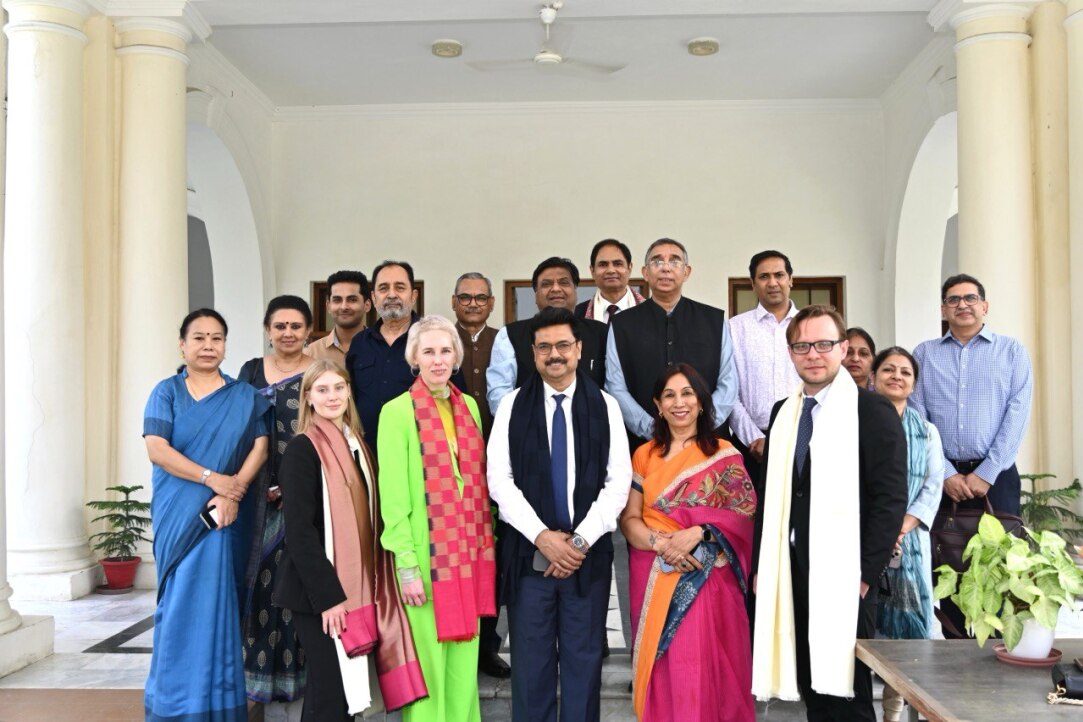
‘Cities Are Key Actors of Interaction in the Global Arena’
The HSE Faculty of Urban and Regional Development (FURD) and India’s leading research centre, the Observer Research Foundation (ORF), have agreed to strengthen their partnership comprehensively in the study and analysis of urban development across BRICS countries. In addition, students and experts from Russia and India will take part in joint academic events and research projects.

HSE University Presents Game Engineering Innovations at Moscow International Video Games Week
HSE University recently participated in a key 2025 gaming industry event, the Moscow International Video Games Week (MIVGW). HSE MIEM took part in several formats, hosting an open day for its online Master’s programme ‘Digital Engineering for Computer Games’ and a workshop ‘Gamedev Automation: How AI is Changing the Approach to Virtual Simulation Design.’ Furthermore, the ‘Game Engineering and Interactive Systems’ workshop and indie studio Bear Head Studio showcased their new game engine—the Claw Engine—at the exhibition area at Skolkovo. Experts of the HSE Faculty of Computer Science joined in panel discussions.

International Conference on Corporate Sustainable Development to Be Held at HSE University
On December 12–13, 2025, the School of Finance of the HSE Faculty of Economic Sciences will host the Third International Annual Conference ‘ESG Corporate Dynamics: the Challenges for Emerging Capital Markets.’ Representatives of leading Russian and international universities will discuss the issues involved in companies’ transition to sustainable development principles and in managing new types of risk.

'At the Intersection of Mathematics, Biology, and Machine Learning, I Found My Place'
Aleksei Shmelev conducts research in genomics and uses machine learning to explore the history of human populations. In this interview with the HSE Young Scientists project, he discusses the adaptive introgression of Tibetans and Denisovans and the use of IBD graphs to predict human population membership.

HSE and UTM Present Results of Mirror Laboratory's Work at Russian–Malaysian Commission
HSE University–St Petersburg and the Universiti Teknologi Malaysia (UTM) presented the results of two years of work and a development roadmap for the mirror laboratory on social entrepreneurship. The document outlines the strategy for global transformation in the business and digital innovation sphere.

Scientists Uncover Why Consumers Are Reluctant to Pay for Sugar-Free Products
Researchers at the HSE Institute for Cognitive Neuroscience have investigated how 'sugar-free' labelling affects consumers’ willingness to pay for such products. It was found that the label has little impact on the products’ appeal due to a trade-off between sweetness and healthiness: on the one hand, the label can deter consumers by implying an inferior taste, while on the other, it signals potential health benefits. The study findings have been published in Frontiers in Nutrition.

Applications for Participation in XXVI April International Academic Conference Still Open
Applications can be submitted on the conference website until December 16, 2025. The programme has been developed around five research themes: Economics, Human Capital and Society, Instrumental Methods and Models, Foresight Research, and International Research. The heads of these areas have presented, in video format, the priority topics and sections for which they are expecting submissions.

'I Have Always Been Fascinated by Deciphering: Reading Texts That No One in the Modern World Had Ever Read Before'
The deciphering of a recently discovered inscription at the Iraqi archaeological site of Tell Dehaila has led to a major breakthrough: the settlement was inhabited during the New Babylonian period, from the eighth to the sixth centuries BC, extending its known lifespan by more than a thousand years compared to earlier estimates. Ilya Arkhipov, Deputy Director and Associate Professor at the Institute for Oriental and Classical Studies of the HSE Faculty of Humanities, spoke to the HSE News Service about the Russian–Iraqi expedition, his passion for antiquity, and the teaching of ancient languages and Oriental history at HSE University.

‘Keep Working, Keep Publishing—Consistency Matters’
Ziyuan Zhu, from Beijing, China, is an international PhD student at the Institute for Public Administration and Governance at HSE University in Moscow. In this interview with the HSE News Service, Ziyuan talks about how studies can influence one’s outlook on life, comparing public service models in different countries, and why being a Chinese student in Russia is advantageous in research.

HSE University–St Petersburg Signs Three Cooperation Agreements with Leading Indian Universities
A delegation from HSE University–St Petersburg has signed cooperation agreements with key educational institutions in India during a visit to the country. Among the projects are new programmes for academic exchange and mobility.


Submission Deadline: December 20, 2025